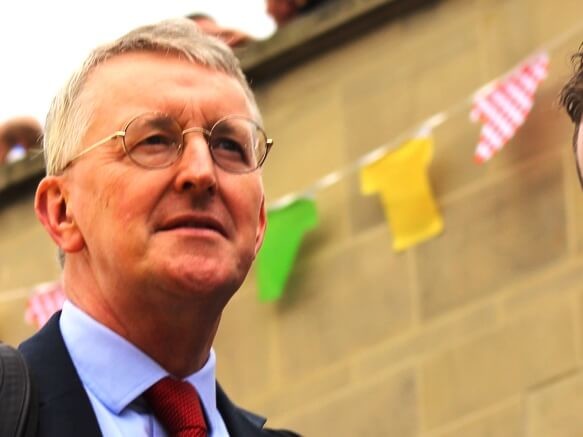SO, the UK now has warplanes bombing Syria.
The nation’s politicians made their feelings clear in the House of Commons – but to what effect?
The 10-hour debate may have seemed long – but with 630-some MPs, relatively few were allowed more than a few minutes to express their reservations or put forward their arguments. Some remarks were emotional and passionate – but the process prompts the question of whether this was effective use of parliamentary time.
Watching on TV every so often, attendance in the chamber remained impressive throughout – but the very motion itself added to the pressure for (over-)simplification.
Many commentators as well as those who got to speak made the point that, despite advancing technology, bombing from the air is a clumsy means of combat – potentially causing more ‘collateral damage’ and collateral damage than the more precise actions of the infantry for example.
Acclaimed author Michael Murpurgo observed during a television interview that neither the German blitz on London nor the British bombing of Dresden had been effective during the 1939-45 war.
Remarks in both the formal House of Commons debate and accompanying television and radio interviews seemed to overlook some of the immediate context regarding technology and attitudes towards conflict.
Technology tested
In terms of technology, nearly three weeks earlier, national outlet journalists, academic commentators and politicians had been celebrating the electronic surveillance that had allowed the killing of ‘Jihardi John’ using a drone and ‘smart’ munitions.
The following day, Paris was attacked – and surveillance agencies changed from being heroes to villains with hours, even though precautions at the Stade de France prevented individuals carrying explosives from getting into the stadium.
Politicians – in the name of universal security – then argued that stricter surveillance measures should be put in place, even though the deathtoll, social and economic impact of road traffic accidents remain far greater.
Disembling’s long-term impact
The lasting effect of the dissembling of former US president George W Bush and his acolytes defense secretary Donald Rumsfeld and vice president Dick Cheney, taken together with the ‘dodgy dossier’ collated in the UK while Tony Blair was prime minister has been a political horror of ‘boots on the ground’.
The lives lost and the vengeance instilled as a result of putting troops into Iraq and Afghanistan have left a legacy that precludes such action when, apparently, the need is greater than ever.
Ironically, the United States deployed ‘special forces’ in the area on the day that the debate about using air power was taking place in London.
Relatively recent conflicts – such as the UK’s challenge to Argentina over islands in the South Atlantic in the early 1980s and ‘Gulf One’ – show that short, sharp action can achieve clear aims without evolving into ‘mission spread’ or fatigue.
Similarly ironically, the privatisation of many military logistics mitigates against this – as companies’ prime financial interests benefit from prolonging rather than shortening such conflicts.
Indeed, the announcement by UK prime minister David Cameron that the country would be buying additional and expensive war planes came just weeks after revelations that the contractors outsourced to maintain such hardware and administer military recruitment had incurred major delays and were encountering significant ‘shortcomings’ in trying to meet their obligations.
Putting men and women on to the ground in Iran and Syria could well be the most efficient way of destroying Isis.
Using specific expertise – such as that displayed by the US Seals, the French Foreign Legion, the SAS, Parachute Regiment and Royal Marine commandos from the UK – could undermine morale exceedingly quickly, as the reputations of those troops instilled dread in a largely amateur militia.
The appeal of martyrdom for those who did not flee would probably increase the deathtoll – but the ‘professionalism’ of those units would be a great advantage.
David Cameron can be accused of cowardice for not grasping this greater challenge.
Yes, the UK, France and the United States would have to be prepared for bodybags being repatriated. Would Labour’s international affairs spokesman Hilary Benn have made the same rousing closing speech in the House of Commons debate, citing the need to counter fascism, have been the same if ground deployment had been proposed?
Labour leader Jeremy Corbyn should not be dismissed for championing diplomacy over military intervention, but when any clique or cult becomes deaf to such entreaties, military intervention – and all its consequent, lasting horrors – is, tragically, the only alternative.
Despite the apparent efficacy of the highly-sophisticated (and expensive) ordnance being used by the UK’s Tornado and Typhoon aircraft, the UK’s military chiefs are already constrained. (The Financial Times provided – December 3, 2015 – an illuminating analysis by Mark Odell of the costs and limitations of the their serviceability, the operating price of approximately £35,000 per air hour, and the £80,000 price tag of Brimstone missiles. The FT notes that Tornadoes cannot fire these precise missiles because cuts in 2010 that slowed an improvement programme.)
If, as another FT columnist George Parker notes, ‘Syria is a messy conflict that might only conceivably be addressed with messy solutions’, then political cowardice over putting troops on the ground may well make it both messier and longer.
+++++
Terminological exactitude
Terminology remains challenging. UK prime minister David Cameron has taken to following the US line of using ‘deash’ while others referred to Isil or IS. The argument that the target is neither Islamic nor a state undermines ‘Islamic State”.
Those who advocate undermining the regime’s credibility through ridicule have included one comedian who suggested ‘cystisis’ – because this is a painful irritation.

